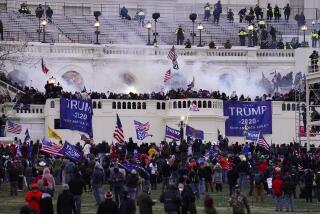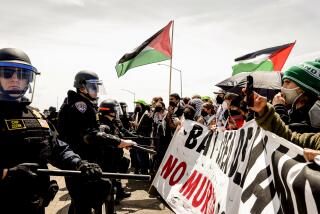Protesters Burn U.S. Flags at Capitol; 4 Are Arrested : Law: The demonstrators said they intend to test the constitutionality of the new statute against flag desecration.
WASHINGTON — Chanting “Burn, baby, burn,” four demonstrators torched several American flags on the steps of the U.S. Capitol Monday in a protest staged to challenge the constitutionality of the new law banning flag desecration.
The four flag-burners were quickly arrested by Capitol policemen and charged with violating the federal law that took effect at midnight Friday. If convicted, they face maximum penalties of one year in jail and $1,000 fines.
“We defy your law and we challenge you,” Nancy Kent, a spokeswoman for the protesters, said in a statement read on the center steps of the east front of the Capitol.
“Arrest us. Test your statute. Take it back to the Supreme Court and try once again to claim it is all consistent with your constitutional standards of free speech,” she said.
With those words of defiance, the protesters unfurled four American flags and started to set them afire in full view of the scores of tourists milling about the east plaza of the Capitol on a bright and sunny autumn day.
“Burn, baby, burn,” the protesters chanted as the flags went up in flames. “Stop the fascist flag law!” one of them shouted.
Capitol police officers, alerted to the possibility of a protest beforehand, moved in quickly with fire extinguishers. They pulled one torn flag from the hands of one of the demonstrators before he could burn it, but other flags were set ablaze before police could intervene.
Kent said four flags were torched in the demonstration. Capitol police spokesman Dan Nichols said: “We have the charred remains as evidence; but, because of their condition, we haven’t been able to ascertain how many were actually destroyed.”
Nichols added that the protesters, who were also charged with disorderly conduct and demonstrating without a permit, would probably be held overnight in the Capitol jail and turned over to District of Columbia police today, when they will be arraigned.
Kent, who did not participate in the actual flag burning and who was not arrested, said afterward that the demonstrators intend to mount a court challenge to the constitutionality of the law, which was passed by Congress earlier this month after the Supreme Court overturned a Texas statute prohibiting flag burning.
In that case, the Supreme Court set aside the conviction of Gregory (Joey) Johnson, who burned an American flag at the Republican National Convention in Dallas in 1984.
Johnson, 33, of Richmond, Ind., was one of the four protesters arrested at the Capitol on Monday. The other three were Shawn Eicher, 24, of New York City; David Blalock, 39, of Johnstown, Pa., and Scott Tyler, 24, of Chicago.
Blalock is a member of Vietnam Veterans Against the War, a group that sponsored a flag-burning demonstration against the new law in Seattle over the weekend. Similar protests were held in Berkeley, Calif., and in New York City. Kent identified the other groups involved in Monday’s protest as the Coalition Opposed to Censorship in the Arts and the Revolutionary Communist Youth Brigade, with which Johnson is affiliated.
“Today they tried to suppress political expression in the name of the flag. Tomorrow what next will become forbidden? We need only look at Nazi Germany to see an answer to that,” Kent said, reading the protesters’ statement.
The law enacted by Congress represented a compromise between legislators who wanted a constitutional amendment to ban flag-burning and those who, seeing an infringement of free speech rights, wanted no legislation at all.
Those who, like President Bush, favor a constitutional amendment argued that the new law would be unlikely to survive a test of its constitutionality in the courts.
More to Read
Sign up for Essential California
The most important California stories and recommendations in your inbox every morning.
You may occasionally receive promotional content from the Los Angeles Times.










